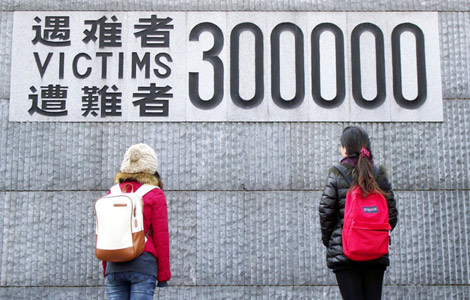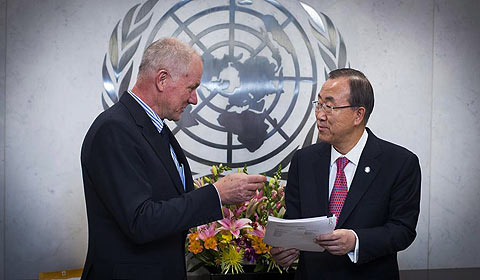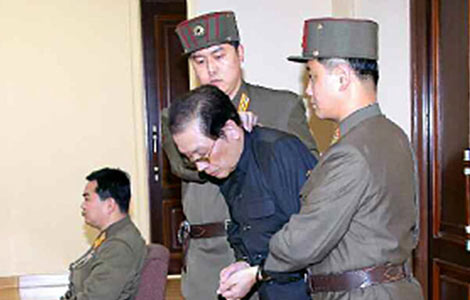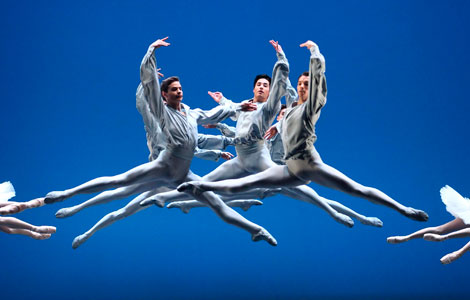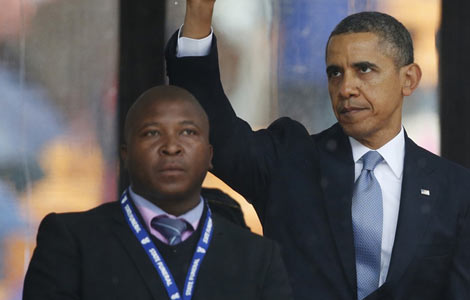
Country mourns the of Mandela and commemorates his immortal legacy
Few foreign leaders have been written about in Chinese textbooks, but millions of Chinese high school students know Nelson Mandela as "a modern hero". He was a true freedom fighter, says one book. "Instead of bowing to this unjust system of government, he became a lifelong warrior in the battle to free South Africa. Today, thanks to the sacrifice of Mandela, apartheid has been outlawed. Everyone in South Africa now has an equal opportunity at home and at work to live comfortably."
Even though the great hero passed away on Dec 5 at the age of 95, his story and legacy will remain in China, and his name will forever be remembered by the Chinese people.
Chinese Vice-President Li Yuanchao on Dec 10 expressed deep condolences and paid tribute to the former South African president, saying the Chinese will always cherish Mandela's contribution to China-South Africa relations.
Speaking at the memorial service held in FNB stadium in Johannesburg, the special representative of Chinese President Xi Jinping said Mandela was the pride of the African people.
"For all his life, he had strived for the liberation of African nations, championed the dignity of the African people and endeavored to advance the unity of all African countries and move forward Africa's cooperation with the world," Li said.
"Mandela was an old friend of the Chinese people and a household name in China. As one of the founding fathers of China-South Africa relations, Mandela had committed himself to China-South Africa friendship and China-Africa cooperation with great passion."
Li said the best way to remember and commemorate Mandela was to advocate his spirit and carry forward his legacy.
Switching from Chinese to English, he concluded his speech: "Although the great man has left, Mandela's thought and his spirit will live for ever."
Hong Lei, spokesman for the Ministry of Foreign Affairs, said that top Chinese leaders regard Mandela highly.
President Xi and Premier Li Keqiang "give great credence to the important role Mandela played in the anti-apartheid struggle and the founding of the new South Africa, as well as his contribution to the development of China-South Africa relations", Hong said.
Mandela's connection with China goes back a long way. In his memoir Conversations with Myself, Mandela said he was inspired by the work of Mao Zedong and Chinese revolutionary experiences.
Mandela was imprisoned on Robben Island for 18 of the 27 years he served behind bars, often doing hard labor.
"He once told me that every morning while he was forced to work, he would usually look east over the sea toward China to encourage him and reinforce what he was fighting for," says Wei Jianguo, a former vice-minister of commerce who worked in Africa for many years.
Mandela read many books, especially biographies of revolutionaries, for knowledge and inspiration. On his long reading list were two books about China: Red Star Over China and Sun Tzu's ancient treatise The Art of War.
Red Star Over China, written by American journalist Edgar Snow and published in 1937, tells of the guerrilla battles of the Communist Party of China, and is notable for its neutral and graphic description of the Long March and Mao Zedong's life.
Mandela took lessons about China's revolution from this book and was deeply impressed by Mao.
He wrote in his autobiography: "I saw that it was Mao's determination and non-traditional thinking that led him to victory."
In an interview with Richard Stengel, a senior editor at Time magazine, Mandela praised China's revolution as "a real masterpiece".
"The Long March," Mandela said, "is indeed a miracle. Once you learned their way of revolution, you will believe that anything is possible."
In 1998, during his presidency, China and South Africa established diplomatic relations.
"The South African people largely know that China was one of the first countries Mandela visited after he came out of prison, and one of the last countries he paid a visit to near the end of his presidential term," says South African Ambassador to China Bheki Langa.
"It was remarkable that over only 15 years since diplomatic relations have been established, economic ties have grown rapidly."
In Johannesburg, South Africans who attended the memorial service were confident that South Africa-China relations will advance due to the legacy of Mandela.
"We have a very good relationship with China and hope Chinese people can feel our inspiration as well," said Nancy Dlimina, a 29-year-old university student. "We must share his spirit for equality in life and love for everyone, and take it higher.
"Mandela was a fighter, who was firmly against racial discrimination and apartheid. His goal was hard to achieve, but his success, especially his strong willpower, won respect from the whole world."
After his first term as president, Mandela decided not to seek a second term. He became a peace ambassador and an HIV/AIDS campaigner, traveling around Africa. "He had always been working hard for the good of the African people," former vice-minister Wei says.
"Mandela had always been friendly toward China. After bilateral cooperation started, he was interested in Chinese agriculture and hoped to realize food self-sufficiency in Africa as well."
That cooperation has expanded to many industries, such as manufacturing, tourism and infrastructure, and China has become South Africa's largest trade partner, he adds.
Wei visited Mandela four times when he worked in Africa.
"Mandela had problems with his legs after years of sleeping on the hard concrete ground in prison, but he insisted on greeting us by standing up every time," he says. "He was a really kind person and full of wisdom."
As one of the world's most charismatic leaders, Mandela won respect and love, regardless of race, ideology or gender, which is very rare, even for world leaders, Wei says.
He Wenping, an expert on African studies at the Chinese Academy of Social Sciences, says the unprecedented scale of Mandela's memorial service showed that his spiritual legacy was shared by the whole world.
"The world is sharing his spirit of reconciliation, the power of forgiveness as well as the unswerving pursuit of peace," she says.
However, South Africa is still facing severe challenges, especially in economic development, she adds.
"This is also why (South African) President Zuma says there is still a along way to go before the goal Mandela pursued is achieved."
As people braved driving rain and cold to honor Mandela at the FNB Stadium, where Mandela made his last major public appearance for the 2010 World Cup final, those in China also expressed their condolences.
Boards printed in Chinese and English bearing Mandela's quotation - "The greatest glory in living lies not in never falling, but in rising every time we fall" - were placed outside the South African embassy compound in Beijing, accompanied by two giant portraits of Mandela and many flowers.
Since his death, the embassy has been deluged with messages by phone and through the Internet, and many Beijing residents have stopped to pay tribute, forming long lines as they waited to sign books of condolences.
Zhang Yiwen, 32, who works with the World Food Program China Office, was one of them.
"Mandela was a fighter for freedom and justice," she said. "It's very inspiring that a single person can have such great achievements. His spirit not only helped me stay strong when facing challenges in my life but also encouraged me to help vulnerable groups."
South African Ambassador Langa says he was overwhelmed by the emotions expressed by the Chinese on Mandela's death.
"We were quite heartened by that. We didn't know he was so well-known and beloved in China," he says.
"Mandela's ideas have been embraced by a lot of people in South Africa, in the ruling party of ANC, and in the present government. So we can be very confident about the development of South Africa in the long term."
Mandela's death dominated Chinese TV channels, while Baidu, the largest Chinese search engine, changed its search page to gray in mourning.
Other major Web portals devoted special sections to him, presenting retrospectives on his life and broadcasting the memorial service live.
Many users posted Mandela's sayings, such as "It always seems impossible until it's done", and "I learned that courage was not the absence of fear, but the triumph over it".
Glorious Years, a song about anti-racism and the struggles of Mandela, registered a high number of clicks among Chinese Internet users over the week.
In 1990, Wong Ka-kui, the lead singer of Hong Kong rock band Beyond, wrote it as a tribute to Mandela's contribution to winning his country's freedom.
In the song, Wong honors Mandela with the lines: "His dark skin gives meaning to his life's devotion to the color struggle" and "He believes in his ability to change the future. Who else can accomplish this?"
It is reported that several years after Wong died in 1993, Mandela heard about the song and cried when he listened to the translated lyrics.
The South African community in Beijing also paid tribute in their own way. "Mandela has served our nation and the world with distinguished dignity, and we will forever remain indebted to him," said Tebogo Lefifi, country manager of Brand South Africa, a government public relations agency, at a memorial event held at a South African restaurant.
"While his passing is a source of sadness, we shall all continue to celebrate his legacy of commitment and service for the improvement of conditions in his own country and around the world," she added.
Many people at the service left messages on a 5-meter scroll, which will be sent to Mandela's family.
Mo Jingxi and Zhang Fan contributed to this story.
|
Chinese pay tribute to Nelson Mandela outside the South African embassy in Beijing on Dec 6. Zou Hong / China Daily |
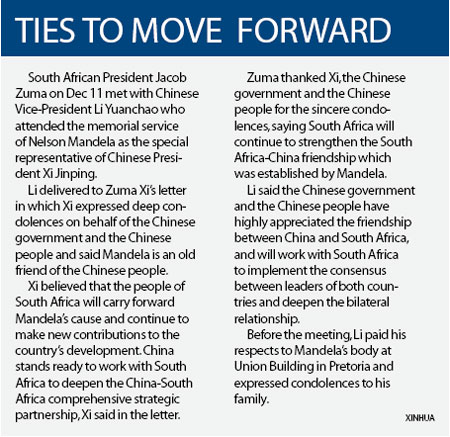
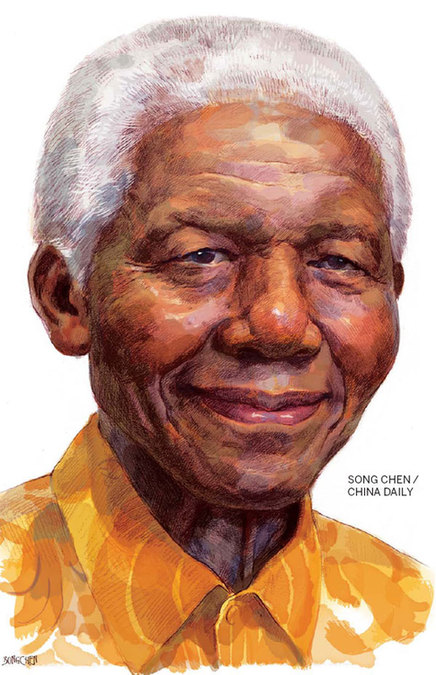
(China Daily Africa Weekly 12/13/2013 page6)
